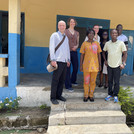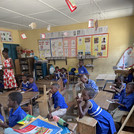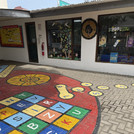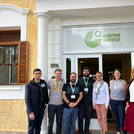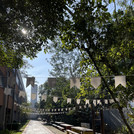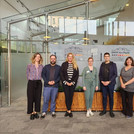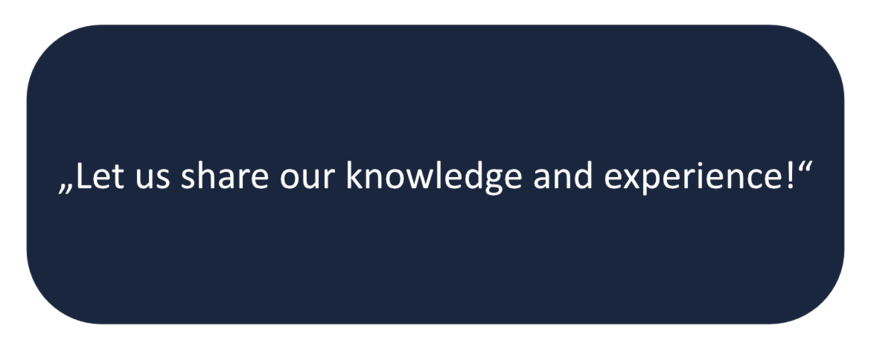International Cooperations
Cooperation with University of Education Winneba (Ghana)
From 11 August to 25 August 2024, Prof. Dr Winnie-Karen Giera and Lilly Wolterdorf were on site in Ghana to visit the University of Winneba and schools and to hold workshops on the chair's projects, among other things.
Visit of University of Winneba (Ghana) in April 2023
Only in December 2022, the Faculty of Philosophy and the Centre for Teacher Training and Educational Research (ZeLB) at the University of Potsdam signed a Memorandum of Understanding with the University of Education Winneba (UEW) in Ghana. In it, they declared their intention to cooperate in the future in the training of teachers and to promote mutual exchange. Now the cooperation is coming to life. The Potsdam junior professor for German didactics in an inclusive context, Winnie-Karen Giera, travelled to Ghana together with the head of the Department of Didactics for German as a Second and Foreign Language, Dr Torsten Andreas, and the ZeLB's internationalisation officer, Dr Manuela Hackel, to get the first projects off the ground.
_________________________________________________________________________________________
"Our host Dean Prof. Dandy Dampson welcomed us very warmly and accompanied us throughout our stay," reports Winnie-Karen Giera. "We were able to have conversations with the professors of the Faculty of Educational Studies. The Vice Chancellor and the Director of the Centre for International Programmes were also very interested in cooperating with the University of Potsdam," says the junior professor, who was impressed by the great hospitality and the extensive programme at the university in Winneba. "The interaction there is informal, collegial and friendly. There is a wonderful sense of humour everywhere," observed Manuela Hackel. "We also found the commitment and great interest of teachers, learners and students very impressive," adds Torsten Andreas.
Winnie-Karen Giera is planning an exchange in teaching and research to promote literacy skills in adolescents and young adults, including in debating, writing, reading and scenic play. Furthermore, she would like to cooperate on inclusion and diversity topics in order to be able to exchange experiences from the ZeLB working group on the "Potsdam Inclusion Didactic Teaching Model", which she leads. In autumn, she will run a workshop week for UEW students on the topic of "Stop Bullying! A Theatre Project" and then organise an online discussion with participating student teachers from Potsdam and Winneba. "Ghana is a country that knows and lives diversity. We in Germany could learn a lot from that," says Winnie-Karen Giera.
Her colleague Torsten Andreas is aiming for a teaching cooperation on intercultural topics such as language teaching and music culture, which is to start this summer semester. And Manuela Hackel is preparing a student exchange with the Institute for Teacher Education and Continuing Professional Development (ITECPD) in Winneba. In addition, Potsdam teacher training students will be able to complete their "internship in educational-psychological fields of activity" at state schools in Ghana. They will then not only receive a cultural introduction, but will also be paired with student teachers from Ghana in a buddy system to learn from each other. During the internship, they are accompanied by UEW. The large practical semester is also to be made possible in Ghana, at the German School in Accra, which the delegation was able to visit on site.
UEW's practical model is twice as extensive as that of teacher training in Potsdam. After observing at schools in the 1st year of study, peer teaching follows in the 2nd year and independent teaching in the 3rd year. "The comparison of study regulations and content could also be interesting, for example in the integration of inclusion topics," says Winnie-Karen Giera. In the future, it will be examined whether study visits to the UEW are also possible.
DAAD sub-project Language Education and Promotion in a Multilingual/Inclusive Context
The aim of the project is to support the pupils of cooperating schools in learning the German language in a multidisciplinary way through practice-tested Potsdam student teachers. The students take part in a seminar that focuses on systematic and pragmatic language education and support in the areas of reading, speaking, writing, presenting and listening. Through the intercultural exchange, the participating student teachers gain an initial insight into the work at German schools abroad, which can be deepened in the Master's programme by completing the school internship (practical semester) of at least twelve weeks at one of the cooperating schools.
Within the framework of the project, we cooperate with the following German schools abroad:
- German Foreign School Jakarta
Further information about the project:
Joint projects for the internationalisation of teacher education
Cooperation with various educational institutions in São Paulo (Brazil)
Prof. Dr. Winnie-Karen Giera, junior professor for inclusive German didactics, travelled to São Paulo, Brazil, at the end of May to deepen existing agreements with scientific and educational institutions and to initiate new cooperation in the field of teacher training and educational research. During the visit to the Faculdade de Educação of the University of São Paulo (FEUSP), the researcher presented her projects "Fair Debating" and "Stop Bullying - A Theatre Project", which had been tested in Potsdam. Plans for a joint study to research argumentative competences of young people were also concretised. "Thanks to the good relations with the faculty, students can get involved here very well," says Winnie-Karen Giera. The faculty offers Bachelor's, Master's and doctoral programmes for the teaching profession, as well as close cooperation with the university school located on campus.
Another goal of the trip was to achieve cooperation between science, school and business. Thus, Winnie-Karen Giera was the first education scientist ever to visit the German House of Science and Innovation (DWIH), an association of German science organisations, universities and the research-based economy. "Our hosts were very interested in our projects and also immediately invited us to an event at the Goethe Institute," reports student teacher Walid Badawie, who accompanied Professor Giera as a research assistant. "The DWIH supports our initiative for a scientific study and arranges business partners who can support the technical implementation," says Giera.
In the largest school in São Paulo, the Colégio Porto Seguro, which leads from kindergarten to the Abitur, the German didacticist from the Faculty of Philosophy presented some of her innovative teaching concepts. A cooperation for the research and digital practice project "Service-Learning Offer for Language Education and Promotion" with the Brazilian school could already be initiated for the coming seminar cycle.
Last but not least, Winnie-Karen Giera and Walid Badawie visited the Colégio Humboldt, with which the professor is already collaborating in her seminar on service-learning provision. The German School of São Paulo was accepted into the Potsdam campus school network "BE A PART", an award that headmistress Marion Krooss was visibly pleased about.

